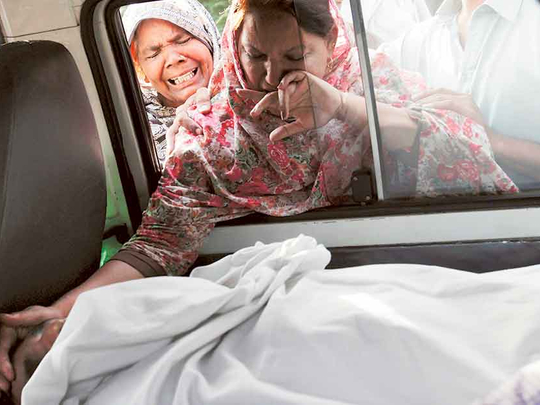
Islambad: Aftab Bahadur Masih spent more than two decades of his youth inside the tiny and dark cells of a Pakistani prison, before a final walk to the gallows this summer.
Masih, who was 38 when he was hanged, was arrested in Lahore in 1992 for murdering a woman and two of her children. In the 23 years between his arrest and hanging, the man was shuttled from cell to cell, waiting for his trials and appeals to conclude.
Even towards the end of his life, he was hoping that the government would commute the death penalty to life imprisonment, according to his family and British charity Reprieve.
The decades of uncertainty, the waiting and then the eventual execution — this is what haunts Pakistan’s death row inmates and their families.
“This is the worst thing that can happen to a person,” said Rizwan Khan, a human rights lawyer in Islamabad.
“It is like punishing people twice for one crime,” said Khan, who deals with scores of similar cases. One of his clients, Mohammad Saleem, has been on trial since 1999.
There are 8,500 death row convicts in prisons across the country, and the government has made clear that it wants to hang them all.
Complicated process
Pakistan ended a six-year moratorium on executions after a Taliban massacre of 136 children at an army-run school in the north-western city of Peshawar in December 2014.
Since then, some 180 convicts have been executed over seven months, a move that has drawn sharp criticism from the United Nations, European Union and human rights groups. Khan blamed the complicated judicial regime and legal process that moves at a glacial pace, coupled with weak prosecution, for the fact that so many of these inmates have to languish behind bars for decades before their executions.
“The convict and the family not only go through mental agony but also have to spend loads of money in courts and jails as fees and bribes,” Khan said.
Hours before his execution in June, Masih wrote a moving narrative about his life in jail and explained how the fear of death had shackled him twice.
“I just received my death warrant,” Masih wrote. “I am innocent but I do not know whether that will make any difference. I die many times before my death... I doubt there is anything more dreadful than being told that you are going to die and then sitting in a prison cell just waiting for that moment,” he continued.
The independent Human Rights Commission of Pakistan has recorded thousands of cases of families suffering because of the protracted trials and delayed executions. “Some families sell their assets to pay for litigation,” commmision spokesman Zaman Khan said. “But they get nothing after the decades of struggle.”
The commission advised the government to commute capital punishment cases to life imprisonment if the convict had spent 15 or more years in jail because of delays in the trials and executions, Khan said.
Pakistan’s slain former prime minister, Benazir Bhutto, commuted the death sentences to life in prison for all prisoners as a one-time concession when she first came to power in 1989.
But analysts said Pakistani society has become far more radicalised than in 1989 and such a decision today would trigger a fierce backlash from hardliners. “No government will ever risk its popularity among the right-wing majority by abolishing the death penalty,” said Roohul Amin Khan, a political commentator.
It was the clerics who were leading the chorus to welcome the government decision to end the moratorium on executions in December.
Poor defendants are represented by public lawyers, who often don’t show up. Naval officer Zulfiqar Ali Khan was hanged after being convicted of a double murder 16 years ago. His lawyers said he was defending himself during a robbery. But his court-appointed lawyer did not meet him once outside of court, present evidence in his defence or challenge witness statements, said legal aid group Justice Project Pakistan.












